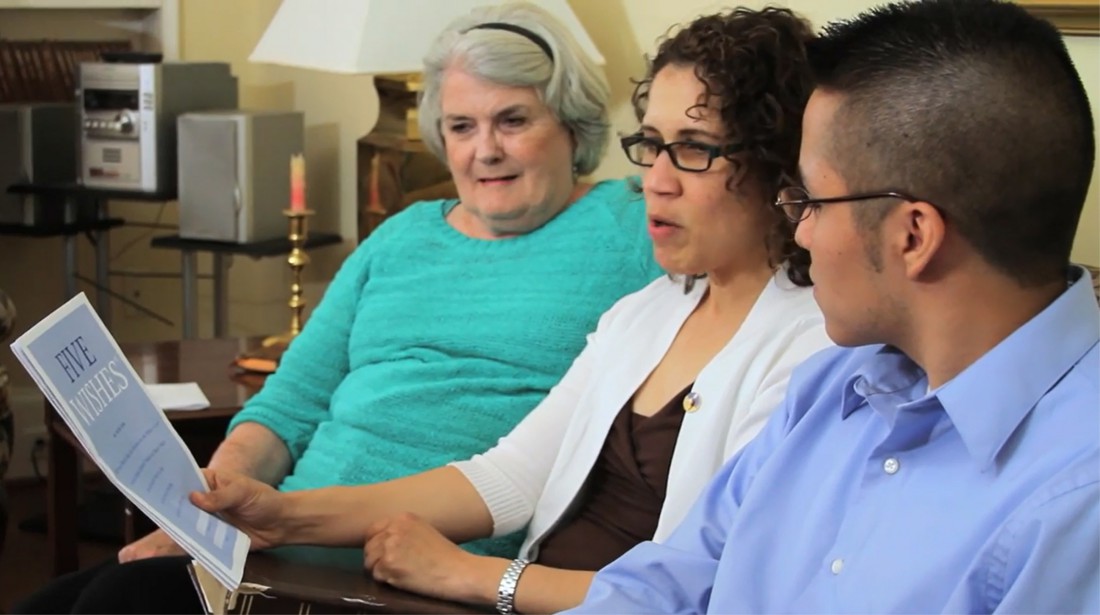Interfaith program focuses on end-of-life planning
Kristin Scott’s mother had strong preferences about her own medical care as she neared the end of her life. She was able to make those wishes clear in an advance care directive, sometimes called a living will. When she passed away two years ago, Scott, facilitator for the WNC Health Network, says, “It was so much easier for us knowing what she wanted.”
While the doctors might have been able to sustain her mother’s life, Scott knew her mother would not have approved. “[My mother] wanted to die at home. … She said, ‘When it gets to the point where I am not able to chew my food anymore, don’t sit there and try to give it to me in a syringe.’ … So that for us was a turning point in making that choice.” Scott admits that it wasn’t the choice she would have made for her mother. And perhaps because of that difference of opinion, Scott believes her family’s situation exemplifies why advance care directives are so important.
The WNC Advance Care Planning Community Initiative will bring the community together for an interfaith event on Monday, May 5, to discuss advance care directives as well as how faith leaders can encourage conversations about end-of-life care in their communities. Kimberly Paul of Begin the Conversation, an organization dedicated to educating people about their health care options, and the Rev. Lisa Bovee-Kemper will speak on the subject. The event is open to all members of the community as well as all faiths.
Jennifer Stuart, WNC Advance Care Planning Community Initiative coordinator, says that only about 38.8 percent of Western North Carolina residents have completed an advance directive. Barriers range from a hesitancy to talk about issues surrounding death to confusion about paperwork, Stuart explains. Some may think that their wishes have been made clear, adds Scott, but in fact they haven’t communicated their plans to physicians or family members sufficiently. “Let’s say, maybe I’ve shared my wishes with my husband,” Scott says, “but guess what? If my husband isn’t around, who’s going to speak for me?”
About two-thirds of WNC residents have not completed an advance care directive — and about the same proportion of Americans die in institutions like hospitals and nursing homes. Stuart says this reality often translates into substantial medical costs for treatment that the ailing individual may not have wanted.
Stuart emphasizes that advance care planning is something that all adults should be thinking about — regardless of their age or current state of health. As years pass and a person’s health changes, she says, the advance care directive will likely change as well.
“Medical care has advanced a whole lot, and people are living longer with chronic conditions,” Stuart notes. “It is helpful to think about the treatments that you want and how you want to be treated before you get to this crisis.”
WNC Advance Care Planning Community Initiative is a community collaboration among advocates of advance care planning. Advance Care Planning is an initiative of the Center for Healthy Aging at MAHEC. Learn more at avl.mx/08d.
More information from the WNC Advance Care Planning Community Initiative:
Who needs advance care planning?
- all adults 18 and over
- adults with multiple chronic conditions
- seniors
- anyone with a terminal illness
What is involved in advance care planning?
- Selection of someone to officially represent you when you are unable to speak for yourself
- Sharing with others what is important to you, your goals for healthcare and preferences for life-sustaining treatments
- Includes forms like the NC living Will and Healthcare Power of attorney
- Especially includes discussion with loved ones and doctors
When do you need advance care planning?
- Before a crisis
- Before you are dying
- Before surgery
- Review advance care plan again when there are changes to health
Why is it important?
- Gift to family and loved ones
- Sharing goals and wishes with loved ones and healthcare providers ahead of times guides the decision of the healthcare provider and loved one in a crisis
Where do I get started?
- WNC ACP Community Initiative is a collective starting point
- Calendar of community ACP events (Buncombe Area)
- Community event ACP partners include OLLI, CarePartners, Council on Aging, Land of Sky Area Agency on Aging, and more
- Forms
- NC forms located at Begin the Conversation
How do I get started?
- Begin by talking with your physician, family or loved ones
- Use online resources (below) for help
- Attend community event for more information
- Schedule a presentation for your group or worksite
Local Resources




Before you comment
The comments section is here to provide a platform for civil dialogue on the issues we face together as a local community. Xpress is committed to offering this platform for all voices, but when the tone of the discussion gets nasty or strays off topic, we believe many people choose not to participate. Xpress editors are determined to moderate comments to ensure a constructive interchange is maintained. All comments judged not to be in keeping with the spirit of civil discourse will be removed and repeat violators will be banned. See here for our terms of service. Thank you for being part of this effort to promote respectful discussion.